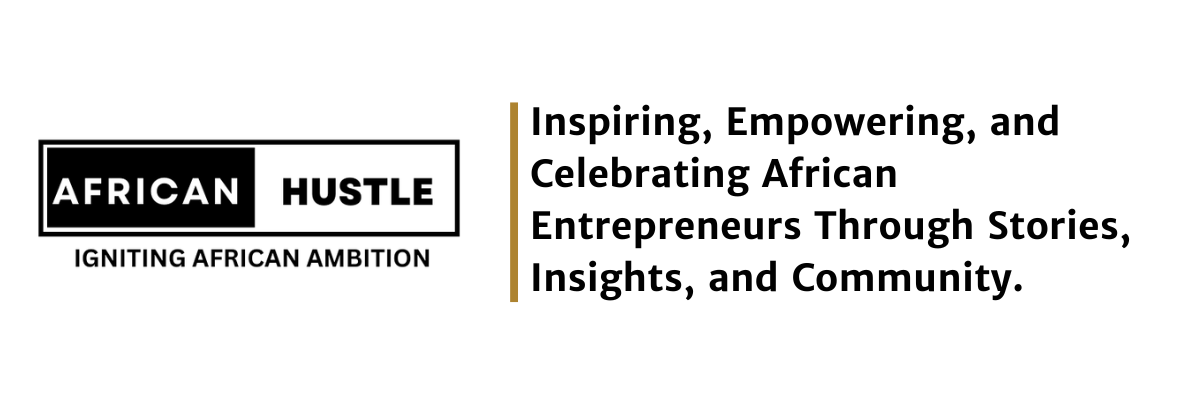
Welcome to African Hustle! Your bi-weekly dose of inspiration and smart insights into African entrepreneurship — featuring real stories about tech, culture, startups, founders, and innovations shaping the future of the continent.

With Trump’s 125% tariffs on $440 billion worth of Chinese goods, American consumers and businesses are actively seeking cheaper, non-Chinese alternatives. This is creating a golden opportunity for African e-commerce businesses. Research shows that 67% of U.S. small businesses are diversifying suppliers away from China, while Amazon’s U.S. marketplace saw a 40% surge in searches for "non-Chinese products." Africa, with its low-cost labour and growing manufacturing hubs, is perfectly positioned to fill this gap. With Africa’s e-commerce projected to hit $75 billion by 2025, agile entrepreneurs can turn Trump’s trade wars into a lucrative export boom.
Could your business be the next African brand to replace a Chinese import?

In a dramatic turn of events, the Trump administration recently announced, and then suspended, a sweeping new punitive tariff regime.
This two-tier tariff regime is made up of a universal 10% tax on all imports, plus steep penalties for certain offending countries. The naughty list includes several countries in Africa.
Days later, the administration temporarily suspended the tariffs for 90 days to allow trade negotiations with those offending countries.
Still, the message is clear. African trade with the U.S. is no longer business as usual. Whether these tariffs are reinstated or revised, the uncertainty alone is already affecting African exporters and entrepreneurs who rely on the U.S. market.
So what’s going on? Who’s vulnerable? And how can African entrepreneurs pivot and even uncover new opportunities amid all this chaos?
What Are the New Trump Tariffs?
Effective April 5, 2025, the U.S. imposed:
A universal 10% tariff on all imports.
Additional country-specific tariffs from April 9, 2025, targeting nations seen as trade "offenders."
The stiffer country-specific penalties were dropped provisionally to a universal 10% rate for all trade partners except China.
Affected African Countries
Several African countries were hit with steep penalties. As you look at the table and see what we charge the US, you sort of start to see how Trump’s trump card is getting countries to the negotiating table.
As other countries retaliated to the tariffs and Africa was supposed to unite and competitively negotiate, the teapot-shaped and economically struggling nation of Zimbabwe became the first country to announce a suspension of tariffs on imports from the US.
Country | New Trump Tariff | What they Charge the US |
|---|---|---|
South Africa | 30% | 60% |
Madagascar | 47% | 93% |
Tunisia | 28% | 55% |
Egypt | 10% | 10% |
Côte d’Ivoire | 21% | 41% |
Botswana | 37% | 74% |
Morocco | 10% | 10% |
Algeria | 30% | 59% |
Nigeria | 14% | 27% |
Namibia | 21% | 42% |
Ethiopia | 10% | 10% |
Ghana | 10% | 17% |
Angola | 32% | 63% |
DRC | 11% | 22% |
Mozambique | 16% | 31% |
Zambia | 17% | 33% |
Tanzania | 10% | 10% |
Senegal | 10%. | 10% |
Cameroon | 11% | 22% |
Uganda | 10% | 20% |
Gabon | 10% | 10% |
Togo | 10% | 10% |
Malawi | 17% | 34% |
Liberia | 10% | 10% |
Zimbabwe | 18% | 35% |
Benin | 10%. | 10% |
Congo | 10% | 10% |
Djibouti | 10% | 10% |
Rwanda | 10% | 10% |
Sierra Leone | 10% | 10% |
Sudan | 10% | 10% |
Niger | 10% | 10% |
Equatorial Guinea | 13% | 25% |
Libya | 31% | 61% |
Guinea | 10% | 10% |
Chad | 13% | 26% |
Mali | 10% | 10% |
Mauritania | 10% | 10% |
Burundi | 10% | 10% |
Central African Republic | 10% | 10% |
Lesotho | 50% | 99% |
Eritrea | 10% | 10% |
South Sudan | 10% | 10% |
Comoros | 10% | 10% |
São Tomé and Príncipe | 10% | 10% |
Guinea-Bissau | 10% | 10% |
Mauritius | 40% | 80% |
Eswatini | 10% | 10% |
Cabo Verde | 10% | 10% |
Kenya | 10% | 10% |
Challenges for African Entrepreneurs
Contrary to the sentiments on the street, these tariffs don’t just hit big exporters. The ripple effect impacts small businesses and solopreneurs too.
U.S. buyers may cancel or scale back orders. African manufacturers, especially in textiles, food, and craft, could see slower demand.
Less demand = less income. Reduced production and revenue declines.
AGOA Benefits Cancelled Out AGOA once gave African exporters duty-free access to the U.S. Now? The new tariffs override those benefits, killing your price advantage.
Exporters may now crowd into the local market, flooding it with goods and driving down prices for everyone.
Cross-border businesses may face customs delays, higher freight costs, and inventory backups, even if they don’t export directly to the U.S.
Startups tied to U.S. trade may see less VC interest or delayed funding rounds.
The African Growth and Opportunity Act, or AGOA is a piece of legislation that was approved by the U.S. Congress in May 2000. The stated purpose of this legislation is to assist the economies of sub-Saharan Africa and to improve economic relations between the United States and the region.
But here’s the silver lining. Tough times force creativity. Entrepreneurs may pivot to new regions, products, or models faster than ever.
How to Turn Tariffs into Business Opportunities
Study and identify the big exporters most likely to bear the brunt of the punitive measures. Then you can position yourself strategically to:
Buy surplus inventory at low prices.
Hire experienced staff laid off by exporters.
Snag production equipment or lease factories affordably.
The U.S. is just one market. Look elsewhere for trade relations.
Europe is especially receptive to eco, organic, or artisanal goods.
Asia & the Middle East have a rapidly growing demand for African products.
AfCFTA: 1.4 billion consumers right next door, duty-free.
AfCFTA (African Continental Free Trade Area) is a free trade area encompassing most of Africa established in 2018 to create a single market for goods and services, aiming to boost intra-African trade and economic integration.
There’s a huge knowledge gap. You could help others by starting a trade and tariff consultancy agency.
Understand trade laws.
Navigate paperwork.
Reposition their business legally for alternative markets.
Build a “Made in Africa” Diaspora-Focused Brand
Promote African-made fashion, skincare, crafts, and food.
Tap into diaspora pride and frustration with trade injustices.
Embrace storytelling: "Embrace Authenticity. Buy African."
Trade within Africa will boom. How about investing in African logistics & fulfilment infrastructure?
Start a local delivery company
Build fulfilment hubs across borders
How to Legally Circumvent U.S. Tariffs
Hustlers always find a way to make things work. We are not suggesting shady tricks. Just smart, legal manoeuvring using global trade frameworks.
Use Tariff-Friendly Transshipment Countries
Send products to a country with a Free Trade Agreement (FTA) with the U.S. or lower tariffs.
Add enough value (e.g., finishing, packaging) to change the product’s origin legally.
Form Joint Ventures with U.S. Companies
Make or assemble part of the product in the U.S. This qualifies it as a U.S.-made good, bypassing tariffs.
Use Third-Party Warehouses
Store your inventory in countries like Canada, the EU, or Mexico.
Fulfill U.S. orders from there to reduce tariff exposure.
Optimize Your Product Codes
Optimizing Harmonized Tariff Schedule (HTS) codes can potentially help lower tariffs, as accurate classification allows businesses to leverage preferential trade terms and avoid misclassifications that could lead to higher duties.
Sell Digital Products
The U.S. is part of a World Trade Organization deal under which countries agreed not to put customs duties on electronic transmissions through March 2026.
Invest in local and regional customers.
Build a brand that thrives in Africa first, then goes global.
Our theme for 2024 was “Think Global, Act African.” It is very relevant now in 2025. The entrepreneurs who stay informed, adapt fast, and move smart will come out stronger.
Build ecosystems, brands, and knowledge. Africa’s business future is still wide open.
Enjoyed this post? Share it with someone who might find it helpful and encourage them to subscribe!
If we missed something, we’d love to hear from you — hit reply and let us know what insights you want us to dive into next.
And if this email was forwarded to you, you can sign up here!

